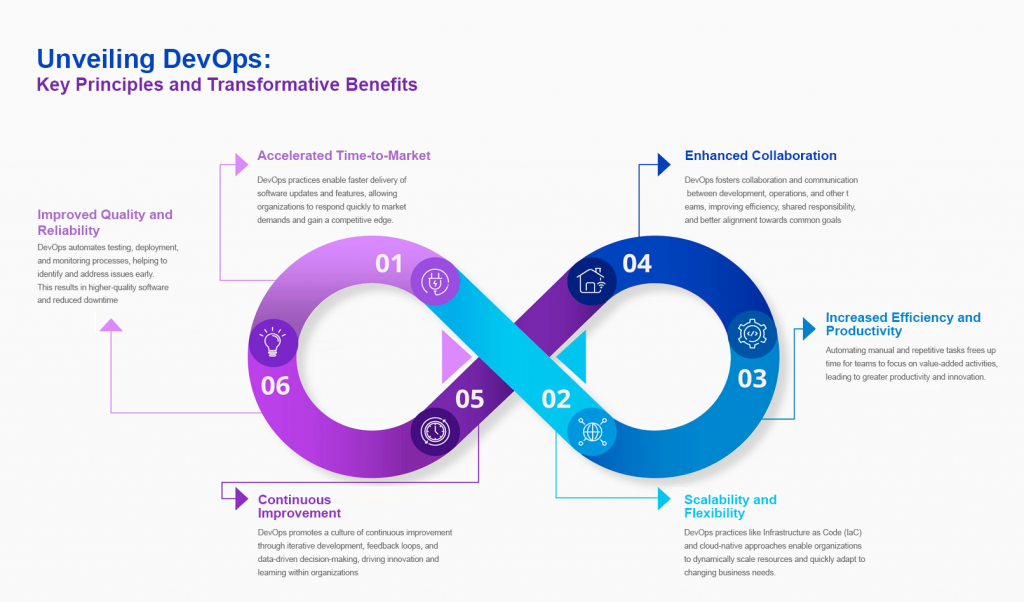
In the ever-evolving landscape of technology, where the pace of innovation often determines market leadership, traditional software development methodologies face mounting pressure to adapt. Enter DevOps: a transformative philosophy that promises to revolutionize how software is conceived, developed, and deployed. In this introductory blog, we embark on a journey to explore the essence of DevOps, unraveling its core principles and uncovering its myriad benefits to organizations worldwide. DevOps, a fusion of “Development” and “Operations,” represents a cultural and technological shift in how software is developed, delivered, and maintained. Join us as we embark on this enlightening exploration of DevOps, where innovation meets efficiency, and the possibilities are endless.
Fundamental Principles of DevOps:
Collaboration: DevOps emphasizes fostering a culture of collaboration and communication between development, operations, and other cross-functional teams involved in the software delivery process. This collaboration breaks down silos, promotes shared goals, and enables teams to work together seamlessly towards common objectives.
Automation: Automation is central to DevOps practices, enabling the streamlining of manual and repetitive tasks throughout the software development lifecycle. DevOps aims to increase efficiency, reduce errors, and accelerate delivery timelines by automating testing, deployment, and infrastructure provisioning processes.
Continuous Integration and Continuous Delivery (CI/CD): DevOps promotes the adoption of CI/CD pipelines, which facilitate the constant integration of code changes, automated testing, and continuous delivery of software updates to production environments. This approach enables teams to deliver software iteratively, rapidly, and with confidence while maintaining high quality and reliability.
Infrastructure as Code (IaC): DevOps encourages treating infrastructure configuration as code, allowing for the provisioning, managing, and scaling of infrastructure resources through code-based automation tools. Infrastructure such as Code (IaC) enables consistency, repeatability, and scalability in deploying and managing infrastructure, thus reducing manual effort and minimizing configuration drift.
Monitoring and Feedback: DevOps emphasizes the importance of continuous monitoring and feedback loops throughout the software development lifecycle. By monitoring application performance, infrastructure metrics, and user feedback, teams can identify issues early, measure changes’ impact, and continuously improve processes to enhance quality, reliability, and user experience.
Benefits of DevOps include:
1. Accelerated Time-to-Market: DevOps practices enable faster delivery of software updates and features, allowing organizations to respond quickly to market demands and gain a competitive edge.
2. Enhanced Collaboration: DevOps fosters collaboration and communication between development, operations, and other teams, improving efficiency, shared responsibility, and better alignment towards common goals.
3. Improved Quality and Reliability: DevOps automates testing, deployment, and monitoring processes, helping to identify and address issues early. This results in higher-quality software and reduced downtime.
4. Increased Efficiency and Productivity: Automating manual and repetitive tasks frees up time for teams to focus on value-added activities, leading to greater productivity and innovation.
5. Scalability and Flexibility: DevOps practices like Infrastructure as Code (IaC) and cloud-native approaches enable organizations to dynamically scale resources and quickly adapt to changing business needs.
6. Continuous Improvement: DevOps promotes a culture of continuous improvement through iterative development, feedback loops, and data-driven decision-making, driving innovation and learning within organizations.
In conclusion, DevOps represents a transformative software development and delivery approach, emphasizing collaboration, automation, and continuous improvement. By breaking down barriers between development and operations teams, DevOps enables organizations to accelerate time-to-market, enhance quality and reliability, and foster a culture of agility and innovation. Embracing DevOps principles and practices empowers organizations to meet the demands of today’s fast-paced digital landscape, driving efficiency, productivity, and competitive advantage.
At KARYA, we recognize DevOps as more than just a buzzword; it’s a guiding philosophy that shapes our approach to delivering value to our customers. By fostering a culture of collaboration and continuous improvement, we empower our teams to break down silos, streamline workflows, and drive efficiency across the software development lifecycle. Through automation and infrastructure as code, we ensure that our solutions are agile and scalable but also robust and reliable.
For details, please visit https://www.karyatech.com/.